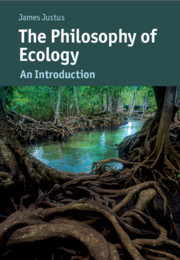Book contents
- The Philosophy of Ecology
- Cambridge Introductions to Philosophy and Biology
- The Philosophy of Ecology
- Copyright page
- Contents
- Figures
- Preface
- Introduction
- 1 The Ecological Niche
- 2 Distinctively Ecological Laws and the Reality of Biological Communities
- 3 The Balance of Nature
- 4 Modeling in Ecology
- 5 Biodiversity
- 6 Progress in Applied Ecology
- 7 Fact and Value in Applied Ecology
- References
- Index
Introduction
Why Philosophy of Ecology?
Published online by Cambridge University Press: 28 May 2021
- The Philosophy of Ecology
- Cambridge Introductions to Philosophy and Biology
- The Philosophy of Ecology
- Copyright page
- Contents
- Figures
- Preface
- Introduction
- 1 The Ecological Niche
- 2 Distinctively Ecological Laws and the Reality of Biological Communities
- 3 The Balance of Nature
- 4 Modeling in Ecology
- 5 Biodiversity
- 6 Progress in Applied Ecology
- 7 Fact and Value in Applied Ecology
- References
- Index
Summary
G. E. Hutchinson inimitable phrase “the ecological theater and evolutionary play” captures the indispensable contribution ecology and evolutionary science make to understanding the biological world. Both concern vast overlapping portions of that world, and alone neither supplies a complete accounting of it. Just as ecological and evolutionary sciences are at the core of biology, philosophy of evolutionary biology and ecology are at the core of philosophy of biology. This book introduces readers to the philosophically rich issues ecology poses. Ecology has also never been more important as a science, and its philosophy more important to society. Climate change, biodiversity loss, and other looming environmental challenges make ecology’s role in understanding such threats and identifying solutions all the more critical. When ecology is applied and its insights marshalled to address these problems and guide policy-formation interesting philosophical issues emerge. This book explores the often ethically charged dimensions of applied ecological science. Topics include: the ecological niche, whether there are distinctively ecological laws, the reality of biological communities, ecological stability and the balance of nature, ecological modeling and reduction, how biodiversity should be characterized, how scientific progress should be conceptualized when ecology is applied, and the fact/value distinction in applied ecology.
- Type
- Chapter
- Information
- The Philosophy of EcologyAn Introduction, pp. 1 - 13Publisher: Cambridge University PressPrint publication year: 2021



